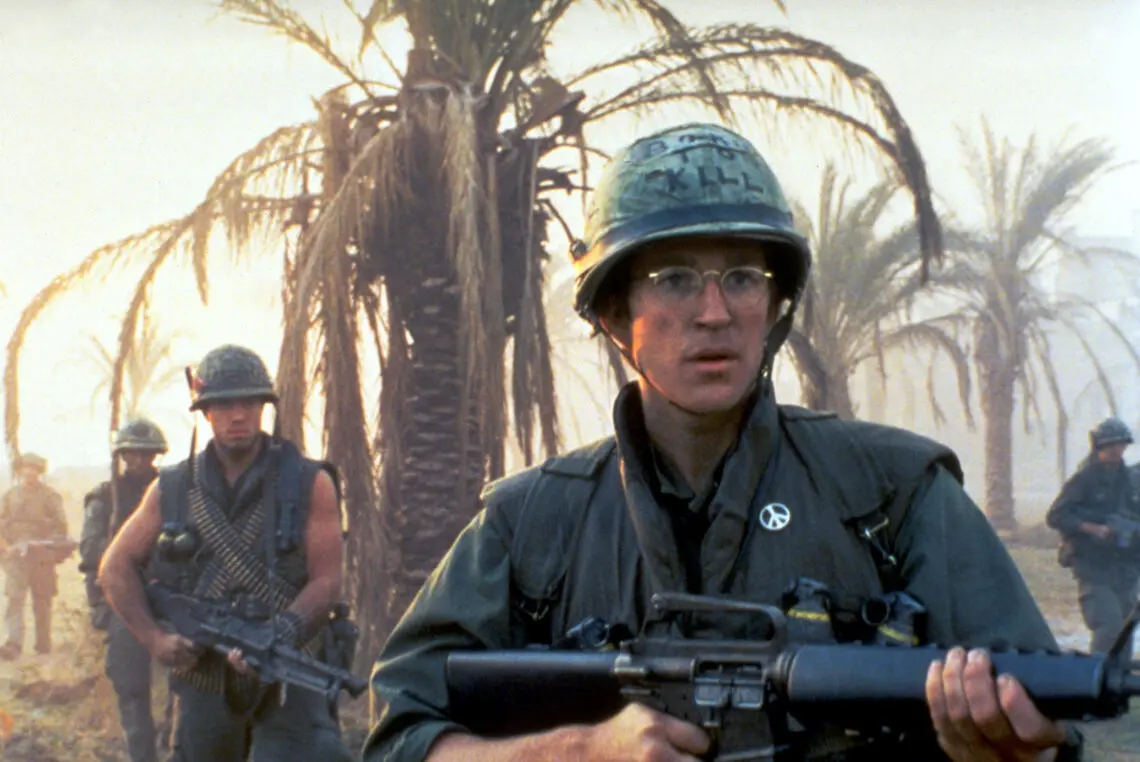Spotlight on controversy: Trump’s use of ‘Full Metal Jacket’ footage draws sharp criticism
The unexpected twist of a classic anti-war film
In a move that has sparked widespread debate, footage from Stanley Kubrick’s iconic anti-war film “Full Metal Jacket” was recently featured in a campaign ad. The ad, which aimed to rally support for traditional military values, repurposed scenes from the 1987 movie to deliver its message. The choice did not sit well with Matthew Modine, who starred as the sardonic marine J.T. “Joker” Davis in the film. Modine did not mince words, drawing a stark and controversial comparison between Donald Trump and Adolf Hitler.
Comparing the use of propaganda: Riefenstahl’s influence
Modine highlighted the parallels between Trump’s campaign strategy and the notorious propaganda techniques of Nazi filmmaker Leni Riefenstahl. “In the 1930s, Leni Riefenstahl directed some of the most effective propaganda films ever made,” Modine pointed out, referencing “Triumph of the Will” and “Olympia”. According to him, these films were masterclasses in manipulation, and despite Riefenstahl’s later denials of knowledge about the Holocaust, their impact remained undeniable.
“Ironically, Trump has twisted Kubrick’s powerful anti-war film into a perverse, homophobic, and manipulative tool of propaganda,” Modine remarked. This statement underscores the actor’s strong disapproval of the repurposing of the film’s content, reflecting his belief that it profoundly distorts the original anti-war message.
Historical warnings: echoes from the past
In his critique, Modine invoked a poignant moment from Riefenstahl’s life. Before her death, Riefenstahl acknowledged her association with Hitler, admitting in a BBC interview, “We saw only the good things; we didn’t know bad things were to come.” This serves as a historical warning, emphasizing the need for vigilance against the dangers of charismatic leaders wielding propaganda. Modine urged the public to heed this warning, implying that the parallels between Trump and Hitler are too significant to ignore.
“Please listen to Riefenstahl’s final warning,” Modine urged. “Trump has shown us who he is and made no secret of what he intends to do.” His comparison is not just to lambast Trump but to serve as a cautionary tale, drawing on historical lessons to inform contemporary political discourse.
Revisiting the iconic scenes: the film’s legacy vs. political adaptation
The ad in question featured one of the most memorable and intense scenes from “Full Metal Jacket”. In it, Gunnery Sergeant Hartman (portrayed by R. Lee Ermey) delivers a brutal tirade against Modine’s character and other recruits. The scene is etched into cinematic history for its raw depiction of military indoctrination.
However, the ad juxtaposed this harsh training with modern military-service members performing in drag, a stark contrast designed to make a point about perceived changes in military culture. This drastic visual opposition seemed to imply that the current military is diverging from its traditional values, aligning with Trump’s caption, “We will not have a woke military!”
The actors’ stance: consent and backlash
The inclusion of Vincent D’Onofrio in the ad, who played Pvt. Leonard “Gomer Pyle” Lawrence in the film, further complicated matters. A representative for D’Onofrio clarified that the actor had “no consent” in the use of his image for the campaign, indicating a significant ethical misstep in the ad’s creation. This adds another layer of controversy to the discussion, highlighting issues of consent and the respectful use of creative works.
Reflections on the film’s original message
“Full Metal Jacket” has long been hailed as a masterpiece that starkly critiques the dehumanization inherent in military training and the horrors of war. By distorting its message to serve political ends, Modine argues, the ad does a profound disservice to Kubrick’s vision.
Kubrick’s film is not just an anti-war narrative but a commentary on the psychological traumas and moral ambiguities faced by soldiers. It presents the complexities of warfare, avoiding black-and-white portrayals and urging viewers to grapple with its unsettling truths. Modine’s strong reaction underscores his commitment to preserving the integrity of this message, warning against its misuse for partisan objectives.
Looking ahead: impact on public discourse
The backlash against the ad highlights the broader implications of repurposing cultural artifacts for political purposes. It serves as a reminder of the power of film and media to shape public opinion and the ethical considerations necessary when leveraging these tools in political campaigns.
As this controversy unfolds, it will be interesting to see how it influences public discourse on the use of media in politics, the preservation of artistic integrity, and the historical lessons we choose to heed or ignore.
For those passionate about preserving the authenticity of iconic films and wary of their exploitation for propaganda, this serves as a critical moment of reflection. Share your thoughts on the unfolding narrative and stay tuned for more insightful discussions on the intersection of film, politics, and history.
Engage with this story by sharing it on social media or following our site for more updates and deep dives into the ever-evolving world of film and media.

 Italian
Italian







